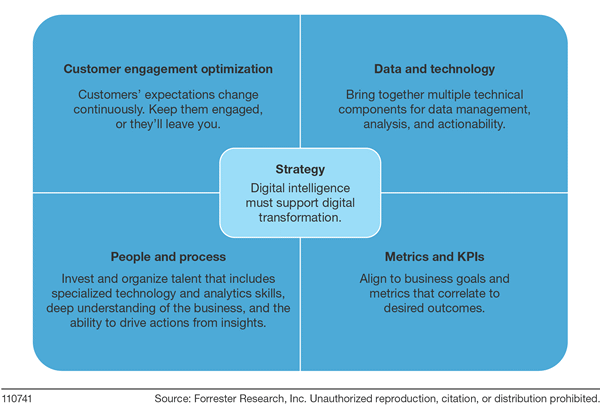Do You Have A Digital Intelligence Strategy That Will Win?
Your digital intelligence strategy and implementation is struggling to keep up with your device-hopping customers. You’re trying. And it’s difficult – so many obstacles. But you face the Digital Dilemma, introduced by colleague Nigel Fenwick: your customers’expectations of digital experience keep rising. When any digital experience they have with you doesn’t meet their expectations, their perception of the value your firm provides falls … which leads to risk of customers taking their business elsewhere. Ouch. So, tackle the Digital Dilemma head on. Focus your digital intelligence strategy like a laser on the customer experiences that matter most to your business outcomes. How? With an actionable digital intelligence strategic plan. Here are 3 of the key components your strategic plan must include.
1. Align the plan to the right metrics and KPIs. The optimal approach is to align measurement with customer-focused KPIs that stakeholders are already measured on. Simple, but not necessarily easy. But this is how you get that laser focus on the experiences that matter most to outcomes.
2. Continuously optimize the customer experience – with the data you need to do that. To execute on this, it’s a baseline requirement to integrate your customer data from across all digital sources. This enables you to liberate and democratize your data-driven insights. Your goal: you want stakeholders and execs to be talking in hallways about the DI insights you provide – and more importantly, about the actions they need to take to improve customer interactions.
3. Bring together data and technologies that live in silos. Yes, more about data. Manage data at the user level. And focus – probably more than you are now – on optimization technologies. Showing results from even simple test-learn-act activities helps build visibility and momentum about the value digital intelligence provides.
The chart below gives an overview of all 5 of the components of a digital intelligence strategic plan. Forrester clients can use this report, which I wrote along with James McCormick, for additional detail to help you with your plan – and on success factors for strategic plans that work. Those factors include:
- Focus on what’s measureable and best aligned to near-term and midterm strategy
- Make digital intelligence easy to adopt by aligning activities with your firm’s culture
- Build for speed by bringing analytics and action closer together
- Build effective business cases to invest in digital intelligence as an enterprise asset
Figure: Five Components of a Digital Intelligence Strategy

